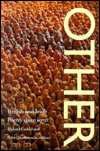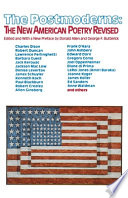Reviews
Anthologies for Dinner
Jeffery Beam
Any anthology worth its salt must teach and exhilarate. If it doesn't affirm tradition and strike new fire simultaneously it fails. Most fail from the weight of the attempt.

|
|
Poems for the Millennium, Vol. 1: From Fin-de-Siècle to Negritude.
Jerome Rothenberg & Pierre Joris, Eds.
University of California Press, 1995.
811 pages. $24.95 (papercover).
ISBN: 0520072278
|

|
|
Poems for the Millennium, Vol. 2: From Postwar to Millennium.
Jerome Rothenberg & Pierre Joris, Eds.
University of California Press, 1998.
871 pages. $24.95 (papercover).
ISBN: 0520208641
|
Jerome Rothenberg's re-visioning talent created America: A Prophecy, Shaking the Pumpkin, Technicians of the Sacred, Exiled in the Word, and Revolution of the Word, all seminal anthologies which re-conceptualize poetic maps into new geographies. In Poems for the Millennium, Rothenberg and poet Pierre Joris form the first global anthology aimed at measuring the unseen grids that form a century of poetic experiment. Instead of the usual chronology of major figures, these volumes seek works that "Significantly test the limits of poetry, both from a structural and an experimental point of view." The result is astounding, forming a provocative and instructive course in aesthetics, imagination, and vision. Structured using movements (Surrealism, Objectivism, Negritude, etc.) as vortices for historical moments, loose chronological galleries of other poets orbiting the vortices, and interwoven commentaries, manifestoes, and other documents—including visual ones—interconnecting and fleshing out the time frames, Millennium "fugues" 20th century poetry beyond established molds. Readers will discover many writers and artists they have never heard of, but major figures enter here also . . . with new clothes. Rothenberg and Joris have compiled an ambitious, and certain to be controversial, anthology which assumes one world. At once hermetic and revelatory, Millennium accomplishes what no other anthology has ever done—incites a handbook for consciousness as well as a lesson-book for poetic possibility. If every person who considers him or herself a poet would study this book and take its premises to heart, the face of poetry would change for the better.

|
|
Other: British and Irish Poetry Since 1970.
Richard Caddel & Peter Quartermain, Eds.
Wesleyan University Press, 1999.
320 pages. $19.95 (papercover).
ISBN: 0819522589
|
Since World War II, much British and Irish poetry has been produced outside the mainstream. As in North America, only a determined seeker can ferret out the work which oftentimes appears in small journals and in self-published forms. These alternative poetries many times seem to share only their otherness—but such diversity breeds similar undercurrents of disjunction in the work. Richard Caddel, founding director of the Basil Bunting Poetry Centre, University of Durham (and a poet and publisher himself), and Peter Quartermain, a distinguished critic of these poetic outsiders, have collected a satisfying and revealing range of British and Irish writers distinguished by their desire to place themselves outside the mainstream. Presenting 55 poets (including poets Thomas A. Clark and Harry Gilonis whose work appears in this issue of Oyster Boy Review), Other seeks to "redress the balance by making available a body of work hitherto obscured." The editors argue forcefully that it is time to forego centralized closed-system approaches to culture which insist on a single "great tradition." Acknowledging worth in the mainstream, the editors nevertheless insist that frequently its "typical poem is a closed, monolineal utterance, demanding little of the reader but passive consumption." They also celebrate the evolutionary freedom afforded by the forced or chosen separation of alternative poets. These poets offer multiple forms and require reader emotional and intellectual participation. Grateful recognition is made to early 20th century American poets who fed these varied streams—William Carlos Williams, Charles Olson, Louis Zukofsky, Robert Duncan, Robert Creeley and Lorine Niedecker—poets who founded Objectivist and Black Mountain College traditions. Other, fascinating in its variety, is an essential anthology.
Four other recent publications add to the 360 degree vision needed to understand and appreciate poetry in its modern context.

|
|
The Postmoderns.
Donald Allen & George F. Butterick, Eds.
Grove Press, 1982.
436 pages. $14.95 (papercover).
ISBN: 0802150357
|
This revised edition of the 1960 anthology, The New American Poetry, which originally introduced the general public to the Black Mountain, Beat, San Francisco Renaissance, and New York School poets, adds a number of poets not included in the first edition, a new preface, and updated biographical and bibliographic notes. United by postmodernist concerns for spontaneity, formal and syntactic flexibility, and the importance of creator and process to writing itself, these poets confirm the importance and influence of these major American alternative poetic streams. The New American Poetry singularly transformed my view of poetic practice when I discovered it in the early seventies.

|
|
World Poetry: An Anthology of Verse from Antiquity to Our Time.
Edited by Katharine Washburn & John S. Major.
W. W. Norton, 1998.
1,338 pages. $45.00 (hardcover).
ISBN: 0393041301
|
An anthology of this size and scope must necessarily hit the high points and would seem to imply substanceless fluff. But this generous and well-balanced collection of world poetry does a very admirable job, even with 20th century American verse, of presenting both mainstream and alternative poets. Arranged chronologically, World Poetry covers the Bronze and Iron Ages up to the present with brief, but thorough, introductions to each section. This is a volume to keep by your favorite chair and dip into on a slow afternoon. Surprises await you.

|
|
The Sounds of Poetry: A Brief Guide.
Robert Pinsky.
Farrar Straus Giroux, 1998.
129 pages. $16.00 (hardcover).
ISBN: 0374266956
|
A number of contemporary poets such as Mary Oliver and Alfred Corn have offered their own handbooks to poetic prosody. United States Poet Laureate, Robert Pinsky, focuses on prosody without making a technical manual. He states, "Poetry is a vocal, which is to say a bodily, art. The medium of poetry is a human body: the column of air inside the chest, shaped into signifying sounds in the larynx and the mouth. In this sense, poetry is just as physical or bodily an art as dancing." Encouraging the understanding of poetry by acknowledging the innate ability of each of us to understand the shades and nuances of language, he elaborates the need to recognize (not necessarily by terminology, but by sound-sense) the vocal cadences of verse. The Sounds of Poetry urges the necessary realization that poetry and the body are deeply and profoundly connected, and that its pleasure is holding a poem in the mouth and speaking it aloud.

|
|
Making Your Own Days: The Pleasures of Readingand Writing Poetry.
Kenneth Koch.
Scribner, 1998.
317 pages. $27.50 (hardcover).
ISBN: 068483992X
|
Kenneth Koch, who revolutionized the teaching of poetry, explores the idea of poetry as a separate language, rooted in the common human ground of sound and breath. With his engaging voice and accumulated teaching wisdom, Koch employs a wide-range of poetry from Ovid to Bessie Smith to teach how to read and enjoy a poem. Enjoyment is the key word here, and Koch instructs how to navigate the imagined complications our poor poetry schooling has conditioned in us. A book for young adults or accomplished poets, Making Your Own Days is a valuable addition to the appreciation of poetry. Koch states, "Poetry lasts because it gives the ambiguous and ever-changing pleasure of being both a statement and a song."